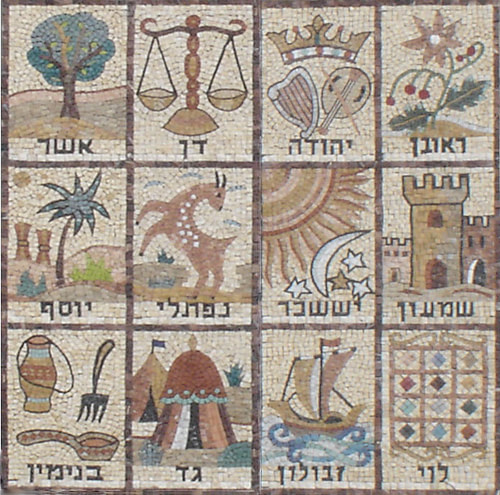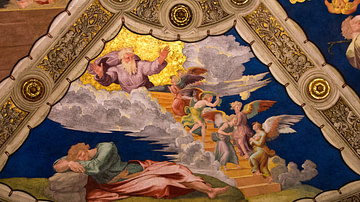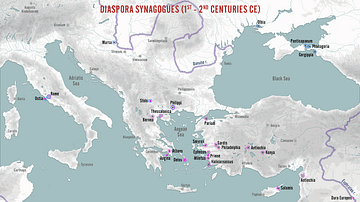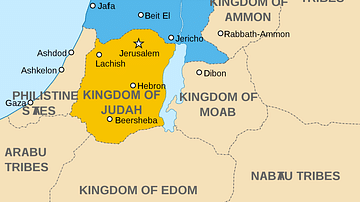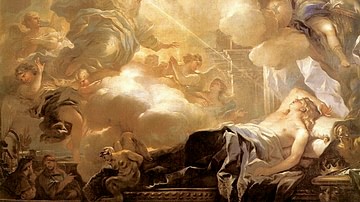The Twelve Tribes of Israel refer to the sons of the Jewish Patriarch Jacob and are important for the tribal lineages of those who constituted the nation of Israel. In the ancient world, all ethnic groups developed stories of their ancestors in what are known as foundation myths as bloodlines were important in maintaining ancestral lineage and provided status as identity markers.
The twelve sons of Jacob, in order of their birth, are:
- Reuben
- Simeon
- Levi
- Judah
- Dan
- Naphtali
- Gad
- Asher
- Issachar
- Zebulun
- Joseph (Manasseh, Ephraim)
- Benjamin
Birth order was important in the practice of primogeniture, or the eldest son inheriting most of his father’s resources, and then distribution following the rank of the others. In the biblical narrative, after the death of Joseph in Egypt, his portion was given to his two sons, Manasseh and Ephraim. Each son’s status was later coordinated in the tribal territories they received in Canaan. Jacob undoubtedly had other daughters, but only one is mentioned, Dinah (see below).
Jacob
Jacob was the younger son of Isaac and Rebecca. Isaac was the child of the promise given by the God of Israel, to Abraham, the traditional founder of the nation. Jacob stole his brother’s birthright (as the eldest) and had to flee East to Haran (Northern Iraq), where some of Abraham’s relatives still lived. There he met Rachel at the well and asked her father Laban for her hand. Laban required that Jacob work for him for seven years first. He did so, but the night of the wedding revealed that it was the older sister, Leah, who was given. Jacob protested, but Laban told him to work another seven years and he could have Rachel as well.
The narrative then goes into quite elaborate detail concerning Jacob’s children. At first, Leah gave birth to some sons, while Rachel was barren. Rachel then offered Jacob her servant (an ancient form of surrogate motherhood in the case of infertility). Leah then became barren for a while and offered her servant as well. All this activity reflected the later traditions as to where and why the sons inherited certain tribal areas in the land of Canaan. It was tied to the identity of their mothers, Leah and Rachel, and the two servant women, Bilhah and Zilpah.
| Leah | Rachel | Bilhah | Zilpah |
|---|---|---|---|
| Reuben | Joseph | Dan | Gad |
| Simeon | Benjamin | Naphtali | Asher |
| Levi | |||
| Judah | |||
| Issachar | |||
| Zebulun |
Wanting to go home and reconcile himself with his brother, on the way back Jacob was accosted at night by a being with whom he wrestled. Various retellings describe a man, God, or an angel. Jacob demanded a blessing, and he now received a new name: "Israel" or "one that struggled with the divine angel or with God and lived". Hence, all his descendants became Israelites.
In Canaan
Genesis offers a few more stories about Jacob and his children's life after their return to Canaan. Dinah was the daughter of Leah and Jacob. She went to visit some women in Shechem. The son of the local chief Hamor, who was also named Shechem, took her and raped her. Shechem loved Dinah and asked his father to obtain her from Jacob (34:6-10).
Then Shechem’s father Hamor went out to talk with Jacob. Meanwhile, Jacob’s sons had come in from the fields as soon as they heard what had happened. They were shocked and furious, because Shechem had done an outrageous thing in Israel by sleeping with Jacob’s daughter—a thing that should not be done. But Hamor said to them, "My son Shechem has his heart set on your daughter. Please give her to him as his wife. Intermarry with us; give us your daughters and take our daughters for yourselves. You can settle among us; the land is open to you. Live in it, trade in it, and acquire property in it. (34:6-10)
Because their sister had been defiled, Simeon and Levi insisted that Shechem had to be circumcised first. Hamor and Shechem agreed and convinced all the Shechemites to undergo the rite as well. Three days later, "while all of them were still in pain" (Genesis 34:25), Simeon and Levi slaughtered Hamor, Shechem, and the entire clan, looting their villages. Some modern scholars consider this story as being inserted later, with Jewish ideas of impurity arising from idolatrous Gentiles, non-Jews. In some periods of later Jewish history, there were bans against intermarriage with such people. Dinah is featured in the modern novel by Anita Diamant, The Red Tent.
Joseph
The two sons of Jacob by Rachel were Joseph and Benjamin. Rachel died in childbirth with Benjamin. Because of his love for Rachel, these were Jacob’s favorite sons. Joseph was a dream-interpreter and told his brothers about a dream where they encircled Joseph and bowed down to him. When a caravan came along on its way to Egypt, they sold Joseph into slavery. They took the special robe Jacob had made for Joseph, covered it in blood, and told Jacob that Joseph was dead. As a dream-interpreter, Joseph was able to decode Pharaoh’s dream and became the vizier of Egypt.
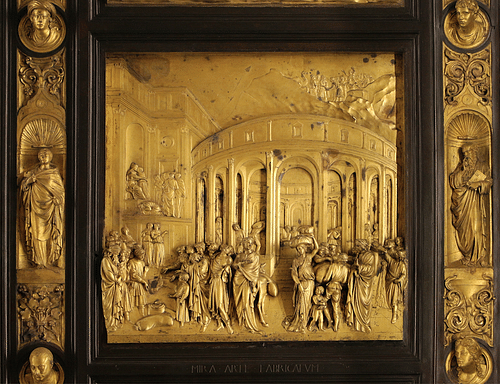
This set up the story of how the Twelve Tribes moved to Egypt. When there was a famine in Canaan, Jacob sent his sons to Egypt to negotiate for food. They did not recognize Joseph, who played several tricks on them, but eventually, he forgave his brothers and told them to bring the clan to Egypt. They prospered in Egypt until a Pharaoh arose who did not remember Joseph and enslaved the Israelites to build his grain cities.
Jacob’s Deathbed Blessings
At the end of Genesis, when Jacob is dying, he addresses each of the sons (chapter 49). Deathbed blessings were honored (as carved in stone) and were used as a literary device to predict future events:
Then Jacob called for his sons and said: "Gather around so I can tell you what will happen to you in days to come: "Reuben, you are my firstborn, my might, the first sign of my strength, excelling in honor, excelling in power. Turbulent as the waters, you will no longer excel, for you went up onto your father’s bed, onto my couch and defiled it. [There was an earlier story that Reuben had sex with his father’s concubines (second, legal marriages)]. Simeon and Levi are brothers—their swords are weapons of violence. Let me not enter their council, let me not join their assembly, for they have killed men in their anger and hamstrung oxen as they pleased. Cursed be their anger, so fierce, and their fury, so cruel! I will scatter them in Jacob and disperse them in Israel. Judah, your brothers will praise you; your hand will be on the neck of your enemies; your father’s sons will bow down to you. You are a lion’s cub ... The scepter will not depart from Judah, nor the ruler’s staff from between his feet, until he to whom it belongs shall come and the obedience of the nations shall be his." (Genesis 49:1-10)
It continues to the last son. Again, the blessings reflect later traditions when the tribes were settled in the land. As firstborn, Reuben should have inherited the mantle of authority, but he sinned against his father. Simeon and Levi slaughtered the tribe of Shechem. This blessing explains why Judah, the fourth son, inherited the promise to rule over the others (in his descendant, King David). Levi, whose descendants were Moses and Aaron, did not receive a portion of land. Aaron became the first high-priest. Instead of land, Levities became the personnel of the Temple when it was built in Jerusalem. Not working the land, all the other tribes were to contribute to the upkeep of the Levites with their sacrificial offerings of meat, bread, and wine. The Levites were also assigned cities of refuge in the land.
From Tribal Confederation to Babylonian Exile
The books of Joshua, Judges, and 1 Samuel relate the conquest and settlement in Canaan after the Jews escaped from Egypt (Exodus). By tradition, the Jews were told at Mount Sinai that they should not be like the other nations. This applied to governance as well; Israel was to have no human king because God was their king. Upon settlement in Canaan, the Israelites ruled through a tribal confederation. This was a joint venture to organize battles against the Canaanites, as well as the later Philistines. At this time the Israelites had a portable tent of meeting that housed the Ark of the Covenant (containing the stones tablets of the laws that God gave Moses on Mt. Sinai). To avoid jealously and any tribe claiming dominance, the tent was rotated among the various tribal lands. These various cult sites (such as Shiloh) produced many of the sources and stories of the tribes for this period.
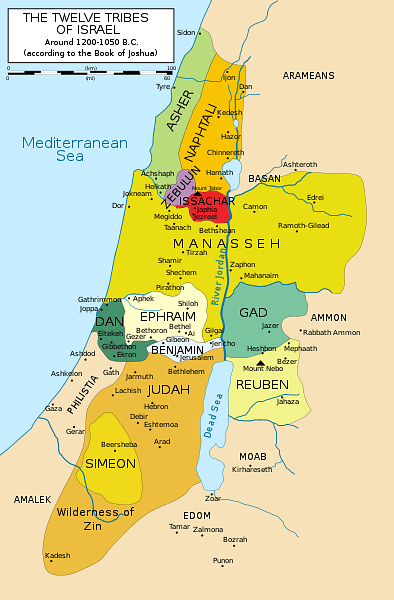
When the Tribal Confederation was not sufficient to fight the Philistines, the people asked the Prophet Samuel to "give us a king" (1 Samuel 8:5). The first king, Saul, was a poor model, and when he was killed, the tribes elected David as king. This period became known as the united monarchy and was viewed as a golden age. His son, Solomon, built the first Temple complex in the new capital of Jerusalem.
Despite Solomon’s fame of wealth and wisdom, his building programs conscripted labor from the tribes. After Solomon’s death (c. 920 BCE?), the tribes approached his son to stop the practice. He refused. Ten of the tribes seceded and formed a separate kingdom in Northern Israel. Two tribes remained loyal, Judah and Benjamin, and formed their own kingdom in the South (the kingdom of Judah). For the next two hundred years, these kingdoms sometimes joined to fight off foreign invaders, but quite often fought each other (2 Kings, and 1 & 2 Chronicles).
In 722 BCE, the Assyrian Empire invaded the Northern Kingdom of Israel and destroyed it. The Assyrians had a policy designed to squelch any future rebellion from a conquered territory. They literally exchanged populations by moving out the Israelites and replacing them with their own people. The destination and survival of these ten tribes remains a mystery. They became the ten lost tribes of Israel, lost to history.
The Assyrian Empire was conquered by the neo-Babylonian Empire. The Babylonians conquered Jerusalem and the Southern Kingdom in 587 BCE and destroyed Solomon’s Temple. With a similar foreign policy, the captives were taken to Babylon. This period is known as the Babylonian Exile (being exiled from the land). When Cyrus the Great (r. c. 550-530 BCE), founder of the Achaemenid Empire conquered the Babylonians, he permitted the Jews to return and rebuild their Temple (539 BCE). Thus, the two southern tribes, Benjamin and Judah were the only tribes who survived.
The Books of the Prophets
The Prophets of Israel served as oracles, or the way in which ancient people communicated with their gods. Prophets were called by God to issue teachings, warnings, and details of social justice. It is in the books of the Prophets where we find an explanation of why God had permitted these disasters. God had used the foreign powers to punish Israel for its sins, the greatest of which was permitting idolatry in the land. At the same time, the Prophets offered a message of hope that God would ultimately intervene in human history one more time, in "the final days" (eschaton in Greek). God would raise up a messiah ("anointed one"), a descendant of David. At that time, there would be a final battle followed by a final judgment. The wicked would be condemned to Hell, while the righteous would have a new Eden on earth, God’s original plan for humanity. At that time, the glory of Israel would be restored, and the rest of the nations subjected to its authority. This included a dominant theme of the restoration of the twelve tribes of Israel, gathered from distant lands.
According to the Prophet Ezekiel:
Therefore this is what the Sovereign Lord says: "I will now bring Jacob back from captivity and will have compassion on all the people of Israel, and I will be zealous for my holy name. They will forget their shame and all the unfaithfulness they showed toward me when they lived in safety in their land with no one to make them afraid. When I have brought them back from the nations and have gathered them from the countries of their enemies, I will show myself holy through them in the sight of many nations. Then they will know that I am the Lord their God, for though I sent them into exile among the nations, I will gather them to their own land, not leaving any behind I will no longer hide my face from them, for I will pour out my Spirit on the house of Israel,’ declares the sovereign Lord." (39:25-29)
In 330 BCE, Alexander the Great (r. 336-323 BCE) conquered the Eastern Mediterranean, including Israel, and instituted Greek rule. The Maccabean Revolt (167-160 BCE) succeeded in victory over the Greeks, and Jewish rule lasted for about a hundred years until Rome conquered Israel in 63 BCE. This period saw an increased hope for Israel, with several self-proclaimed messiah figures, pleading for God’s intervention now. The idea of the restoration of Israel was revitalized in this period.
Christianity
Christians claimed that Jesus of Nazareth was the messiah predicted by the Prophets. He preached the same message as the Prophets but also that the kingdom of God was now imminent. His ministry included the calling of twelve disciples ("students" in Greek), symbolic of the twelve tribes of Israel. The gospels do not always agree on the names, and Luke reported that there were 70 others. However, they are consistently referred to as "the twelve". In Luke’s version of the last supper, their role in the coming kingdom is explicit: "You are those who have stood by me in my trials. And I confer on you a kingdom, just as my Father conferred one on me, so that you may eat and drink at my table in my kingdom and sit on thrones, judging the twelve tribes of Israel" (Luke 22:28-30).
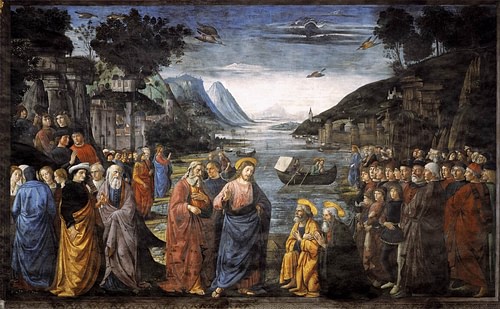
In Luke’s Acts of the Apostles, he utilized the quote from Ezekiel (above) in his narration of the event of Pentecost. Jews were present in Jerusalem to celebrate Pentecost ("from every nation on earth"), and this is when "the spirit of God" was poured out upon Jesus’ followers. In the book of Revelation, John of Patmos wrote about the 144,000 martyrs in heaven (12x12=144). In his vision of the restored Jerusalem, the names of the twelve tribes of Israel are written on the city gates (21:12-13).
Searching for the Lost Tribes
The search for the ten lost tribes of Israel began in antiquity and continues in the modern world. Several writings from late antiquity and the Middle Ages suggested areas to the East of Israel as well as locations in Africa, especially Ethiopia which had a community of Jews. The Beta Israel community of Ethiopia claimed to be descendants of the tribe of Dan. (These Jews were later airlifted to Israel during Operation Solomon at the end of the Eritrean/Ethiopian civil war 1991). With sporadic persecutions of the Jews of Russia and Europe, the hope for a homeland (Zionism) became an important theme that included ways in which to gather in all the lost tribes.
The Assyrian Empire, later conquered by the Babylonians and then the Persians, included a vast territory from Syria to Afghanistan, from northern Arabia to the Black Sea and southern Russia. The region contained the Silk Road, the caravan routes to China and India, and this gave rise to speculation that the tribes could be found among the various peoples of this region. A popular idea was that either the Scythians or the Cimmerians were ancient Jews who adopted tribal customs, and from these regions, tribes spread to Russia, and eventually to Europe.
Abraham Mordechai Farissol (1451-1525) was the first Jewish writer to claim that the indigenous natives of America were the lost tribes. Aaron Levi, who traveled in these regions, claimed that he witnessed the tribes practicing Jewish rituals and they were the descendants of Reuben and Levi. Others claimed that the Jewish communities in India were the descendants. The ten lost tribes began to be identified with Jews who lived in the regions of Afghanistan, Azerbaijan, Myanmar, Kurdistan, Kashmir, and among the Tartars of Russia, Japan, and China.
During the 19th century, Joseph Smith, founder of the community of the Church of Jesus Christ of Latter-Day Saints, claimed that native American tribes were the descendants of the ten who emigrated to the Americas before the Babylonian destruction (587 BCE). The claim included the idea that Jesus came to the Americas to visit them.
With the foundation of the state of Israel in 1948, some Israelis promoted the idea that true restoration would not be achieved without finding the ten lost tribes. Research institutes were established to utilize the new sciences of DNA and genome studies. Using DNA examples of peoples in the Asiatic and African regions, there is some connection to dominant traits of Semitic people of the Middle East (Arabs and Jews), although these mixed over the centuries with local genetic strains. The research continues.
